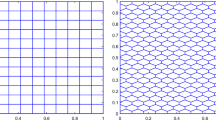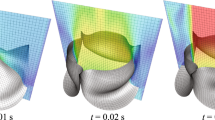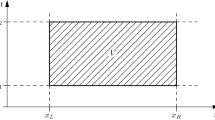Summary
For second order linear elliptic problems, it is proved that theP 1-nonconforming finite element method has the sameL ∞-asymptotic accuracy as theP 1-conforming one. This result is applied to derive optimalL ∞-error estimates for both the displacement and the stress fields of the lowest order Raviart-Thomas mixed finite element method, and a superconvergence result at the barycenter of each element.
Similar content being viewed by others
References
Arnold, D.N., Brezzi, F.: Mixed and nonconforming finite element methods: implementation, postprocessing and error estimates. M2 AN19, 7–35 (1985)
Baiocchi, C.: Estimation d'erreur dansL ∞ pour les inéquations à obstacle. Mathematical Aspects of Finite Element Method, Lect. Notes Math.606, 27–34 (1977)
Ciarlet, P.G.: The finite element method for elliptic problems. Amsterdam: North Holland 1978
Crouzeix, M., Raviart, P.A.: Conforming and nonconforming finite element methods for solving the stationary Stokes equations I. RAIRO Anal. Numer.3, 33–76 (1973)
Douglas, J., Jr., Roberts, J.E.: Global estimates for mixed methods for second order elliptic equations. Math. Comput.44, 39–52 (1985)
Frehse, J., Rannacher, R.: EineL 1-Fehlerabschätzung für diskrete Grundlösungen in der Methode der finite Elemente, pp. 92–114. N. 89 Bonn, Math. Schrift 1976
Frehse, J., Rannacher, R.: AsymptoticL ∞-error estimates for linear finite element approximations of quasilinear boundary value problems. SIAM J. Numer. Anal.15, 418–431 (1978)
Gilbarg, D., Trudinger, N.S.: Elliptic Partial Differential Equations of Second Order Berlin, Heidelberg, New York: Springer 1977
Grisvard, P.: Alternative de Fredholm relative au problème de Dirichlet dans un polygone ou un polyèdre. Boll. Unione Mat. Ital.5, 132–164 (1972)
Grisvard, P.: Behaviour of solutions of the an elliptic boundary value problem in a polygonal or polyhedral domain. In: Numerical Solution of Partial Differential Equations-III (B. Hubbard, ed.), pp. 207–274 New York: Academic Press 1976
Johnson, C., Thomee, V.: Error estimates for some mixed finite element methods for parabolic type problems. RAIRO Anal. Numer.15, 41–78 (1981)
Lascaux, P., Lesaint, P.: Some nonconforming finite elements for the plate bending problem. RAIRO Anal. Numer.9, 9–53 (1975)
Marini, L.D.: An inexpensive method for the evaluation of the solution of the lowest order Raviart-Thomas mixed method. SIAM J. Numer. Anal.22, 493–496 (1985)
Natterer, F.: Über die punktweise Konvergenz finiter Elemente. Numer. Math25, 67–78 (1975)
Necas, J.: Les méthodes directes en théorie des équations elliptiques. Prague: Masson, Paris et Academia 1967
Nitsche, J.A.:L ∞-convergence of finite element approximations. Mathematical Aspects of the Finite Element Methods, Lect. Notes Math.606, 261–274 (1977)
Nitsche, J.A.: Schauder estimates for finite element approximations on second order elliptic boundary value problems. In: Proc. Special Year Numer. Anal. (Babuska, Lin, Osborn, eds.), pp. 290–343. Lectures Notes No. 20., Univ. of Maryland 1981
Rannacher, R., Scott R.: Some optimal error, estimates for piecewise linear finite element approximations. Math. Comput.38, 437–445 (1982)
Raviart, P.A., Thomas, J.M.: A mixed finite element method for second order elliptic problems. Mathematical Aspects of the Finite Element Method, Lect. Notes Math.606, 292–315 (1977)
Schatz, A.H., Wahlbin, L.B.: On the quasi-optimality inL ∞ of theH 10 -projection into finite element spaces. Math. Comput.36, 1–22 (1982)
Scholz, R.:L ∞-convergence of saddle-point approximations for second order problems. RAIRO Anal. Numer.11, 209–216 (1977)
Scholz, R.: OptimalL ∞-estimates for a mixed finite element method for elliptic and parabolic problems. Calcolo20, 355–377 (1983)
Scott, R.: OptimalL ∞-estimates for the finite element method on irregular meshes. Math. Comput.30, 681–697 (1976)
Strang, G.: Variational crimes in the finite element method. In: The mathematical foundations of the finite element method with applications to partial differential equations (A.K. Aziz, ed.), pp. 689–710. New York: Academic Press 1972
Strang, G. Fix, G.J.: An analysis of the finite element method. Englewood Cliffs: Prentice Hall 1973
Wahlbin, L.B.: Maximum norm error estimates in the finite element method with isoparametric quadratic elements and numerical integration. RAIRO Anal. Numer.,12, 173–202 (1978)
Author information
Authors and Affiliations
Additional information
Performed in the research program of Istituto di Analisi Numerica of C.N.R. of Pavia
Partially supported by MPI, GNIM of CNR, Italy
Supported by “Consejo Nacional de Investigaciones Cientificas y Técnicas”, Argentina
Rights and permissions
About this article
Cite this article
Gastaldi, L., Nochetto, R. Optimal L∞-error estimates for nonconforming and mixed finite element methods of lowest order. Numer. Math. 50, 587–611 (1987). https://doi.org/10.1007/BF01408578
Received:
Issue Date:
DOI: https://doi.org/10.1007/BF01408578




